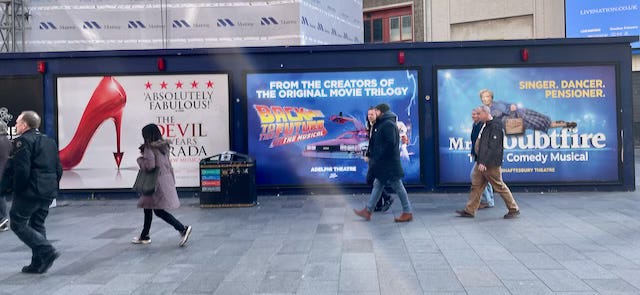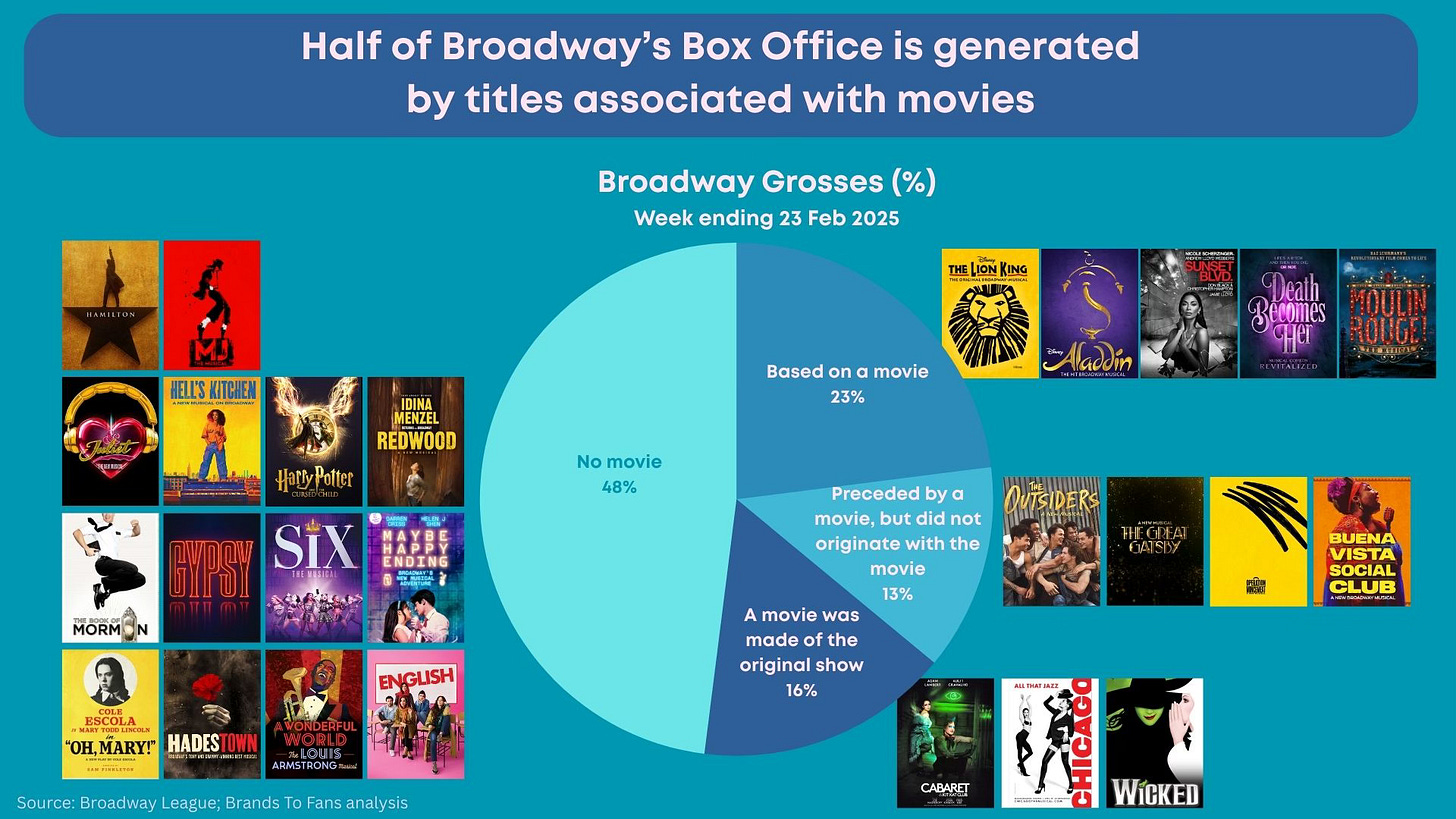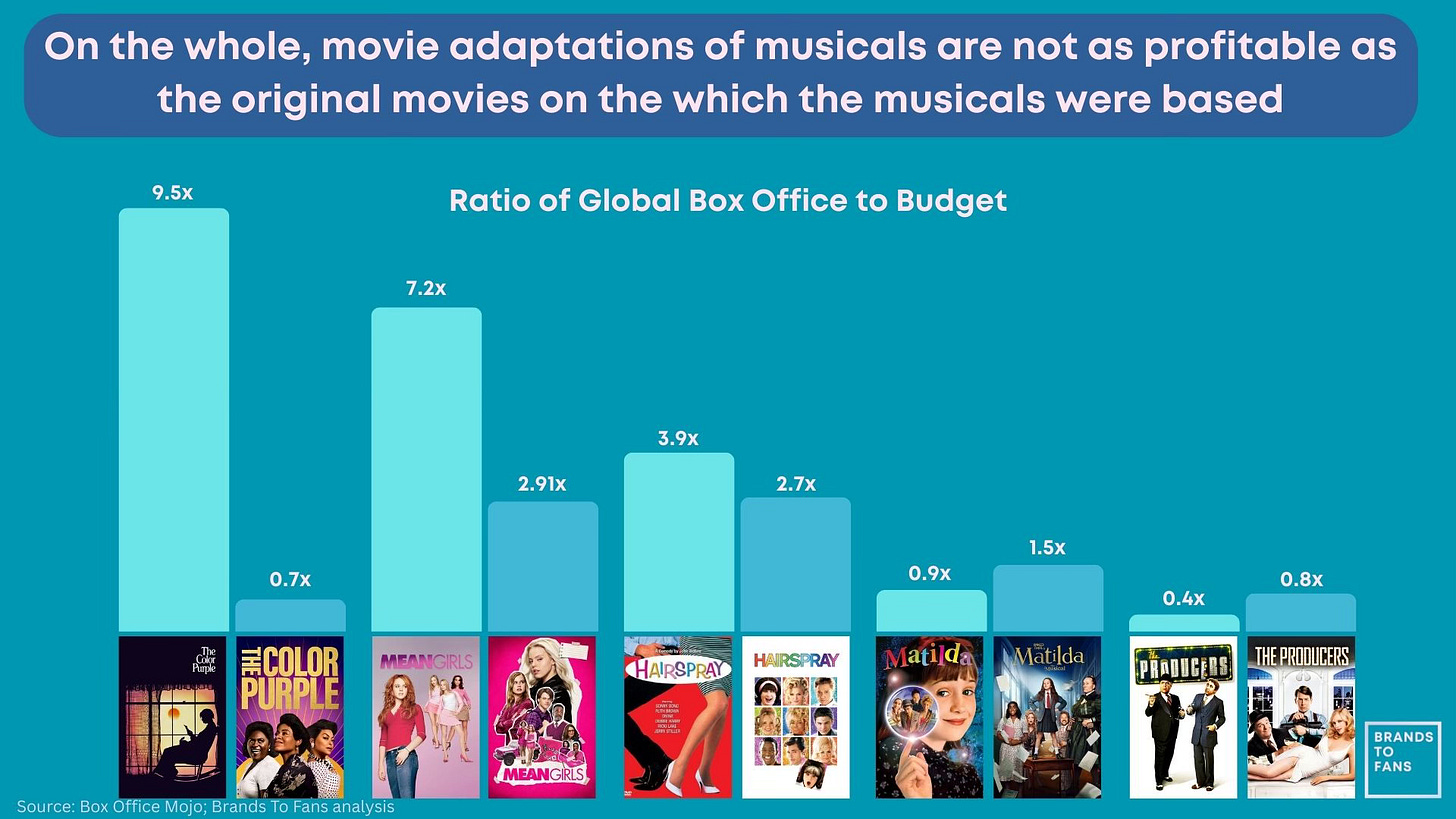The merry-go-round between screen and stage is spinning faster.
It was announced last week that The Hunger Games is getting a stage adaptation, launching in October at a new theatre in London’s Canary Wharf.
It will join Stranger Things: The First Shadow (with whom it shares a set designer) and the long-running Harry Potter and the Cursed Child as blockbuster franchise IP dominating the West End stage.
At a slightly less blockbuster but still ‘IP’ scale, a new musical adaptation of Amy Heckerling’s Clueless (for which she has written the book) premiered this month in London. Here’s the poster, looking fine on London’s underground yesterday.
It joins Mrs Doubtfire, Back To The Future, Moulin Rouge!, The Devil Wears Prada, Magic Mike, The Curious Case of Benjamin Button, and the big daddy of them all, The Lion King, as movie-derived stage musicals packing them into London’s theatres.
Meanwhile, more than half of Broadway grosses are generated by shows associated with movies (they are either based on a movie; preceded by a movie although not directly based on it; or have had a movie based on the show).
Stage to screen
In the other direction, from stage musical to screen, Wicked is nearing the end of its theatrical run at $728m global box office on a $150m budget. A healthier performance than other stage-musical-to-screen adaptations of recent years: West Side Story ($76m global Box Office on a $100m budget); In The Heights ($45m BO on a $55m budget); Cyrano ($6m BO on a $30m budget).
The journey from stage to screen can be a long one, however: it took Wicked over twenty years (and $20 billion in grosses). There is a great podcast interview with its producer Marc Platt here.
There have been persistent clickbait articles over the years that Warner Bros will adapt Harry Potter and the Cursed Child into a movie (or trilogy!). The idea of reuniting the original cast seems irresistible, especially as Daniel Radcliffe is about to turn 36, the same age as Harry in the play. However, the studio needs J. K. Rowling’s agreement to do this and she has consistently resisted the idea, writing in 2017:
“I have no idea how these stories emerge, but to set the record straight once and for all: Harry Potter and the Cursed Child is a stage play, it was conceived and written as a stage play, it was always intended to be a stage play and nothing else, and there are absolutely no plans for it to become a movie, a novel, a puppet show, a cartoon, a comic book series or Cursed Child on Ice.”
Now that Warners are adapting the original Potter novels into long-form TV, a Cursed Child adaptation doesn’t seem likely, especially as the original cast have distanced themselves from Rowling.
In contrast, Lin Manuel Miranda seems more open to the prospect of Hamilton making to the screen, saying:
‘If someone’s got an idea, holla at me’.
IP will eat itself: from screen to stage and back again
Looking ahead, The Royal Shakespeare Company is planning a new stage adaptation of Roald Dahl’s The BFG for January 2026. They will hope to emulate the performance of their earlier Dahl adaptation Matilda The Musical, which belongs to a small but fascinating sub-class: IP that has been released as a movie, then adapted as a stage musical, and then had that stage musical adapted back into a movie.
Before reading further, close your eyes and see how many of these you can name.
The rationale for these adaptations is IP brand recognition and an existing fan base. The built-in awareness helps the marketing and de-risks the project.
That’s the theory, at least. Of this small class of movies-based-on-stage-musicals-based-on-movies, the most successful (in terms of Box Office relative to budget) was last year’s Mean Girls The Musical, which took $105m on a $36m budget, a ratio of 2.9. You have go back to 2007 for the next best: Hairspray The Musical ($204m box office on a budget of $75m, a ratio of 2.7). In 2022 the movie adaptation of Matilda The Musical took $37.2m on a $25m budget, a ratio of 1.5, which is not bad considering that in the US it went straight to Netflix without a theatrical release.
The cautionary tales within this micro-category are 2005’s The Producers ($38m on a $45m budget) and 2023’s The Color Purple ($69m on a $95m budget). But a failed movie adaptation does not seem to dent the prospects of its original stage version - The Producers is returning to the West End this Autumn.
For the completists among you, less obvious examples that I didn’t include on the chart because I don’t have original box office data, are: The Sound of Music, the stage musical of which was based on a German movie from 1955 called The Trapp Family; and The Little Shop of Horrors, which was a Roger Corman release in 1960 (featuring an early role for Jack Nicholson) before being adapted as a stage musical in 1982, and then a movie in 1986.
As for new additions to this screen→stage→screen category, I’m not holding my breath. Bob Gale, who wrote and produced all three Back to the Future movies with Robert Zemeckis, wants to turn the stage musical back into a film but is not getting traction. He told Variety:
“I would like to do the ‘Back to the Future: The Musical’ [movie]. I would love to do that. I think that would be great. I floated that out to the folks at Universal. They don’t get it. So, [there’s] nothing I can do.”
Looking ahead
The pipeline of screen to stage shows no sign of abating. For every ‘Almost Famous: The Musical’ (which closed after two months and 30 performances), there is a ‘The Bodyguard: The Musical’, which is touring again later in 2025 after several revivals since its West End debut in 2012. Meanwhile Dirty Dancing, which seems to have been in a perpetual state of touring in the UK, returns to the West End in October 2025. Nobody, indeed, puts Baby in the corner.
But two forthcoming stage shows I am looking forward to the most?
The first Paddington movie is being adapted into a stage musical, produced by the indomitable Sonia Friedman (who counts Harry Potter and the Cursed Child and Stranger Things: The First Shadow on her resume). The musical will have songs by McFly’s Tom Fletcher and plans to launch before the end of 2025.
And, on a smaller scale but no less exciting, one of my favourite films, Sing Street, is premiering in July at the Lyric Hammersmith.
I’m pretty sure neither of these stage musicals will then need a movie adaptation. But I’d never bet against it.
ICYMI - News from the world of entertainment franchise management
Suits LA - an attempt to extend the Suits franchise following the Netflix overperformance of the original show in 2023 - launched on NBC to underwhelming ratings, although it was given a nice bump when the later streaming numbers came in. It remains to be seen whether it can build from here, but Scott Mendelson is calling it already:
“NBC mistook the momentary, almost accidental popularity from Netflix subscribers of USA's character-focused workplace dramedy for the existence of a monetizable IP.”
Kathleen Kennedy took control of the PR narrative around her pending departure from Lucasfilm. She had this to say to Deadline about managing the content pipeline for such an expansive and multigenerational brand as Star Wars:
“You’re trying to look forward. And at the same time, you’re trying to create stories that feel familiar. So you’re moving into the future, but you’re maintaining a sense of familiarity. I think that’s the hardest balance …
Then when you have a brand that’s this expansive, […] you try to find different entry points for different generations because that’s what Star Wars has always been. It’s a very generational brand, and we want to sustain that, and we work hard to sustain that. So George gave us the gift of storytelling being across lots of different genres, and that gives us a lot of opportunity to try things. What we’ve really enjoyed about the streaming space is we’ve been able to experiment. It’s harder to do that in the movie space. And now I think that that’s why it feels so good to be able to move into a Mandalorian movie as we’re coming off of three seasons of a very successful show. We’ve actually built an audience for that, and we gave the young audience an opportunity to enter Star Wars at a different place and not feel like you have to have seen everything. It can become their Star Wars. And that, I think, is the fun storytelling challenge.”
Commentary and general bleating around Amazon taking creative control of the James Bond franchise continued. Amazon need to get a move on: the copyright on the bond novels starts to expire in the UK and Europe from 2035, leaving them open to new adaptations from third parties (providing they stick strictly to the material in the copyright-expired novels).
Hasbro scored a big PR win with the announcement live on This Morning that Peppa Pig’s mother Mummy Pig is pregnant!
License Global ran a profile on Ludo Studios and BBC Studios’ unstoppable Bluey franchise, including a new Lego tie-up. Some of the Bluey products coming to market are delightful - check out these hightops from Hot Topic:
In less joyful news, Warner Bros Discovery is restructuring its Games division and shutting down three of its studios as it refocuses efforts on its core IP. One of these studios, Monolith, was working on a Wonder Woman game, which is now cancelled.
Sarah J. Maas’ Romantasy publishing phenomenon A Court Of Thorns and Roses (13m sales to date for the series) is potentially in play for adaptation after Hulu cancelled its development. Disney’s option expires in the third quarter of 2025.
As the Creator Economy develops, there has been much commentary around creators making the jump to TV. This week there was a fascinating move in the other direction, as the Sidemen licensed Fremantle format Supermarket Sweep. This follows their successful adaptations of The Wheel and The Chase. I’m sure there is much more of this to come.
Now that Skybound has a hit on its hands with Invincible at Amazon Prime Video (and is no longer just the Walking Dead company), Brands Untapped ran a great interview with Garima Sharma, discussing the nuances around comic-originated IP and the need to differentiate between the needs of the comic fans vs the TV show fans when developing a licensing programme.
That’s it for this week. For those who liked my post The 6 Golden Rules of Franchise Management, here is a downloadable PDF of the headlines, which I created for a LinkedIn carousel and now make available here for you to download, print out, laminate, and tape to your boss’s monitor 😁.
If you enjoyed this newsletter, do click the share button below and also connect with me on Linkedin!








